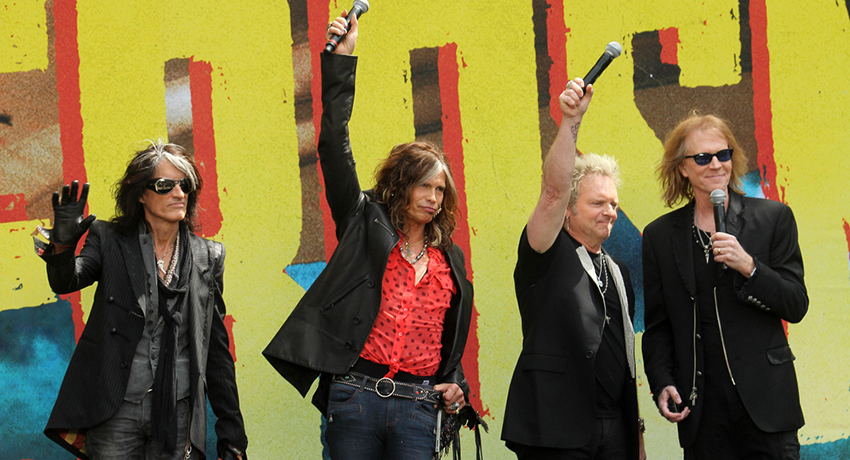Neurologist By Day, Rock Star By Night

Dr. Rudolph Tanzi could Photoshop himself into this image. Aerosmith photo via s_bukley / Shutterstock.com” target=”_blank”>s_bukley / Shutterstock.com
It’s not everyday that a neurologist becomes a celebrity, but for Dr. Rudolph Tanzi, director of the Genetics and Aging Research Unit and Mass. General Hospital (MGH) and professor of neurology at Harvard Medical School, hanging with celebrities is just another day in the life.
Dr. Tanzi would be famous in the science community anyway. He is the “chromosome 21 guy”, the researcher who in the early 1980s discovered that the common disorders affecting the human nervous system, Down syndrome and Alzheimer’s disease, both involve genes residing on human chromosome 21, all while watching the “Love Boat” on a shag carpet in Providence. He was named to Harvard’s 100 Influential Alumni list, alongside President Barack Obama and Bill Gates. He also spearheads the Alzheimer’s Genome Project, which recently identified four new Alzheimer’s disease gene candidates. This achievement was named one of the “Top Ten Medical Breakthroughs of 2008” by Time magazine.
Most recently, Tanzi co-authored the book, “Superbrain” with Deepak Chopra. How did they meet? At a TEDMED conference in the bathroom. Really. Chopra asked Tanzi if the brain was a noun or a verb. “It’s a verb, of course,” Tanzi responded. The two teamed up shortly after that exchange. Tanzi and Chopra talked to Hub Health about the book last year and even gave us some brain-boosting tips. It’s possible that the eventual and hopeful cure for Alzheimer’s could one day come out of his research.
But Tanzi is also famous for another reason. You can hear him playing the keyboard on Aerosmith’s track “Something” on the 2012 album, “Music From Another Dimension” and he also gets to jam with the band on special occasions. Apparently, Joe Perry is now a close friend. The two met on a GQ photo shoot in 2009 for “Rock Stars of Science”. Tanzi tells CNN:
On the shoot, the two started chatting. Tanzi mentioned he played keyboard, so Perry invited him to jam with the band. The two hit it off so well that since then, the Kennedy Professor of Neuroscience at Harvard has been invited to play with Aerosmith on a number of special occasions. His initial direction, he recalled, was to play like a “drunken church lady.”
“It’s been such fun,” Tanzi said.
When President Obama announced that $100 million will be invested in a new research initiative called Brain Research through Advancing Innovative Neurotechnologies (BRAIN) and set an ambitious goal of curing the disease by 2025, Dr. Tanzi will be there on the front lines of the research. According to CNN:
Alzheimer’s has generated a lot of bad news in the past few years. A number of drug trials have failed recently. The handful of drugs that do exist can slow — but not stop — some early symptoms, and even then, only work in less than half the patients. Tanzi, though, believes that with more funding, a cure is possible.
“In general, drug discovery usually takes two or three waves to get there,” Tanzi said. “The first wave already failed. The second wave largely failed, but there is a bit of hope in there. Generally, though, with this third wave that’s coming up in the next few years, I think we’ve learned from our mistakes and I remain optimistic.
“The good news is, largely due to genetics, we know what we need to do. And we have the information that says ‘Here’s how we take the shots on goal.’ “


